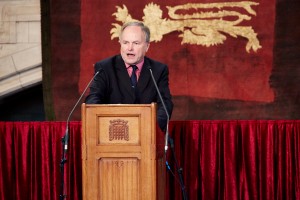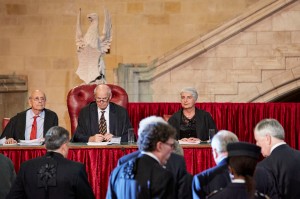
After 800 years, what is the verdict on the actions of the barons at Runnymede in 1215?
The wheels of justice often turn slowly. Last Friday evening around 800 of the legal great and good attended Westminster Hall to witness the barons and bishops put on trial for treason 800 years after they forced King John to agree to the terms of Magna Carta, which limited his powers and paved the way for trial by jury.
In the event, organised by the UK Supreme Court and the Magna Carta 800th Anniversary Commemoration Committee, the barons and bishops (who included coalition legal aid minister and Liberal peer Lord NcNally; Supreme Court Justice, Lord Clarke; former chairman of the Judicial Appointments Committee, Baroness Prashar; and Rt Revd Christopher Lowson, Bishop of Lincoln) were tried by three judges.

The tribunal was made up of Lord Neuberger, President of the Supreme Court, Justice Stephen Breyer of the US Supreme Court, and Dame Sian Elias, Chief Justice of New Zealand.
Blackstone Chambers’ James Eadie QC, who acted for the government in the trial of Abu Hamza and in the dispute over the burial of King Richard III, put the case for the prosecution.
While Landmark Chambers’ Nathalie Lieven QC presented the case on behalf of the barons.
The BBC took centre stage, with newsman Gavin Esler narrating — slipping up slightly stating that the great Charter was sealed in 2015, before setting the record straight.
Former barrister and BBC broadcaster Clive Anderson stole the show – his ad-libs livening up the undoubtedly historically accurate, but sometimes wordy, script.
The reference made by the defence to the King’s actions to limit access to the courts by charging huge sums to bring law suits, intentionally echoed the actions of the government today.
And Eadie’s closing speech touched on the notion of having constitutional matters decided by a tribunal sitting in Europe and warned of the dangers of independent states within these fair islands.
Former Lord Chief Justice, Lord Judge, played the part of intermediary William Marshal, the 1st Earl of Pembroke, who remained loyal to the King and who is buried in Temple Church.
A highlight gleaned from the informative programme while the judges rose to consider their verdict was learning that someone at the Supreme Court holds the job title ‘messenger’. It was at one time held by Derek Allen, now an usher at the court, who played an usher, in the proceedings.
As Big Ben tolled 9 o’clock the judges returned with the verdict – all agreed that the barons were not guilty.
There are apparently three types of treason: lèse-majesté, unjustified threatening the King’s life or the betrayal of the realm or the army; proditio, unjustified default of duty which injured the King or any unjustified plotting against the King; and infidelitas, unjustified violation of an oath of fidelity to the King.
In relation to each type of treason, it is necessary to show that the action complained of was ‘unjustified’.
Concurring with his fellow judges, Neuberger said: ‘In all the circumstances, the prosecution has failed to show that the defendants’ actions were unjustified’.
There was widespread agreement with the verdict, though Sir Robert Worcester, Chairman of the Magna Carta Anniversary Committee, said the decision was ‘far from inevitable’.
But he said it shows how the bravery and determination of those barons eight hundred years ago ‘rings down the centuries as a justified act of rebellion’.
‘Those of us living today in democracies which take the rule of law seriously are reaping the benefits of the barons’ bold demonstration against King John’.
Professor David Carpenter, who played Baron FitzWalter and served as a historical advisor for the event, felt the country could have been spared the subsequent civil war, had the barons not humiliated the King after Runnymede, but agreed that the verdict broadly supporting Magna Carta was ‘absolutely right’.
However, Anderson, as you would expect, stood up for the King whom he said have been ‘astonished and possibly enraged’ by the verdict, and would be considering what further steps he could take to deal with the judges and the barons who defied his authority.
Esler reminded the audience, in an eilogue to the ficticious trial, that the 1215 Magna Carta did not last.
The Pope annulled it by papal bull and declared it ‘shameful, demeaning, injust and obtained under duress’.
Magna Carta was only saved by the deaths of the Pope and King John himself. His heir was a nine-year-old boy, Henry. The loyal barons elected William Marshal as Regent, who crowned the boy as King and immediately reissued the Charter under his own seal.
It doesn’t end there – the Charter was rejected and the war continued. At Lincoln in 1217, forces led by Marshal defeated the French and the rebel barons. Thereafter Marshal again reissued the Charter and it is that which was first called Magna Carta.
So, I guess that means we get to do all this again in two years’ time.
* A video of the proceedings will be available on the UK Supreme Court website later this week.
